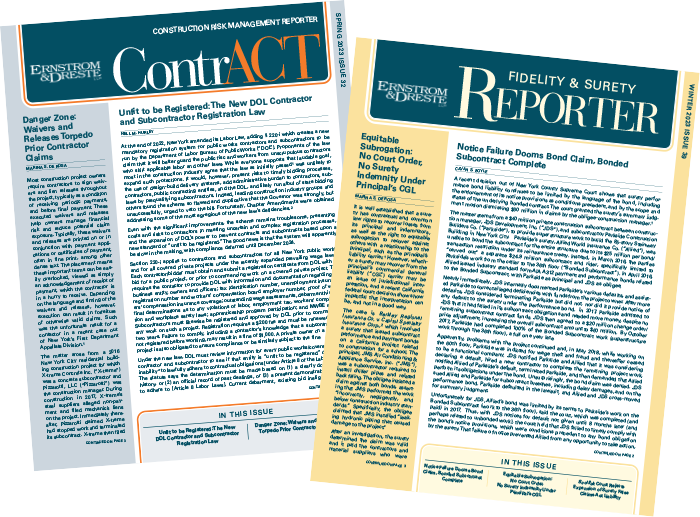Article by: Cavan S. Boyle
Contracting parties may incorporate another document into their agreement by reference and bind themselves, and non-signatories, to the incorporated document’s terms. Because principals often engage sureties after executing their contracts, a full measure of surety liability may not occur until then, or much later, meaning the surety may be stuck with additional, sometimes critical, contract terms. A recent New York Appellate court decision serves as an important reminder of the potential extension of liability where price escalation terms incorporated into a claimant’s subcontract were binding on the surety, despite a “no escalation” term applicable to the bonded prime contract.1 The general incorporation of the prime contract into the subcontract was insufficient to raise an issue of fact on the matter.
The case involved a 2018 public construction subcontract between prime contractor, JBS Dirt, Inc. (“JBS”), and subcontractor Cobleskill Stone Products, Inc. (“Cobleskill”), to provide paving work to construct a municipal airport taxiway for the Village of Sidney, New York (“Village”). JBS’s surety, Merchants National Bonding, Inc. (“Merchants”) issued a payment bond for the project.
The subcontract expressly stated that it was subject to the terms and conditions of a June 2017 quote, which was attached as an exhibit and contained a price escalation clause for the asphalt. Upon completing its work in 2019, Cobleskill sought payment per the quote’s terms, computing asphalt costs based on price indexes at the time work was performed (2019) rather than at the time the quote was issued (2017). Arguing the 2017 prices applied, JBS rejected Cobleskill’s payment application, and Merchants denied Cobleskill’s claim.2 Cobleskill filed suit against both JBS and Merchants. Cobleskill then moved for summary judgment, which the motion court granted.
On appeal, JBS and Merchants argued that the Federal Aviation Administration (“FAA”) Handbook, which expressly forbids price escalation clauses, was incorporated into the subcontract both by direct reference and through a standard flow-down clause, thus creating contract ambiguity sufficient to defeat summary judgment. The subcontract incorporated the prime contract stating:
“[Cobleskill] binds itself to JBS for the performance of [Cobleskill’s] work in the same manner as JBS is bound to the Village for such performance under JBS’s contract with the Village.”
The court was unconvinced. First, the subcontract “expressly stated what documents were included in the [subcontract] agreement,” said the court, and the FAA Handbook was not listed. Second, the court explained that a subcontract’s clause incorporating by reference the prime contract binds a subcontractor “only as to prime contract provisions relating to the scope, quality, character and manner of the work to be performed by the subcontractor.” Because such terms do not cover price disputes, the motion court’s decision was affirmed, meaning JBS and Merchants were liable for the higher prices.3
This result is consistent with the general rule in New York that prime contract clauses unrelated to scope, quality, character, and manner of work can be incorporated into subcontracts, but typically only to the extent the subcontract expressly refers to the prime contract term being incorporated or identifies its location in the prime contract. For example, a specific reference to the “General Conditions” of the prime contract has been found to bind the subcontractor to the prime contract’s General Conditions’ terms.4 The ruling is also consistent with the general enforcement of incorporated documents where they are specifically referenced and attached, as the subcontractor’s quote was here.
Sureties are likely familiar with incorporation by reference disputes regarding provisions of prime contracts related to forum selection, arbitration, and delay damages which can expand surety bond liability and costs if found applicable to them. In many such cases, the surety is arguing against the application of incorporated terms to the surety. Here, the surety sought unsuccessfully to apply the incorporated prime contract provision against the claimant/subcontractor to avoid the result of the subcontract’s express incorporation of its quote.
Besides the broad construct of the general rules of incorporation by reference,5 the case reminds sureties how important it is to ensure that they and their bonded principals are fully familiar with the important terms of the prime contract, and how they may impact liability and future options. With such knowledge, subcontracts can be specifically tailored to properly “flow down” the prime contract terms to the subcontractor, a strategy that would have avoided the result here.
- Cobleskill Stone Prods., Inc. v Merchants Natl Bonding, Inc., 223 AD3d 1021 (3d Dept 2024).
- It seems likely that JBS only became aware of the price escalation prohibition when it submitted its own application for payment to the Village which included Cobleskill’s work with the escalated prices.
- JBS and Merchants also claimed that Cobleskill’s work was defective but since the Village had approved and paid JBS for the work, the court found the claim unsupported by the record.
- New York Tel. Co. v. Schumacher & Forelle, Inc., 60 AD2d 151 (1st Dept 1977).
- At least for New York. Law on the subject can vary by jurisdiction.




